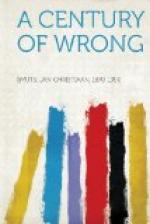The concluding chapter of Mr. Reitz’s eloquent impeachment of the conduct of Great Britain in South Africa is devoted to a delineation of what he calls Capitalistic Jingoism. It is probable that a great many who will read with scant sympathy his narrative of the grievances of his countrymen in the earlier part, of the century will revel in the invective which he hurls against Mr. Rhodes and the Capitalists of the Rand. If happier times return to South Africa, Mr. Reitz may yet find the mistake he has made in confounding Mr. Rhodes with the mere dividend-earning crew, who brought about this war in order to diminish the cost of crushing gold by five or six shillings a ton. In the realisation of the ideal of Africa for the Africanders Mr. Rhodes might be more helpful to Mr. Reitz and the Dutch of South Africa than any other living man. Whether it is possible for them to forget and forgive the future alone will show. But at present it seems rather as if Mr. Reitz sees nothing between Africanderism and Capitalistic Jingoism but war to the death.
Mr. Reitz breaks off his narrative at the point immediately before the Ultimatum. Those curious politicians who begin their survey of the war from the launching of that declaration will, therefore, find nothing in A Century of Wrong to interest them. But those who take a fresh and intelligent view of a long and complicated historical controversy will welcome the authoritative exposition of the causes which, in the opinion of the authors of the Ultimatum, justified, and, indeed, necessitated that decisive step. To what Mr. Reitz has said it is only necessary to add one fact.
The Ultimatum was dated October 9th. It was the natural response to the menace with which the British Government had favoured them three days previous, when on October 6th they issued the formal notice calling out the Reserves for the avowed object of making war upon the South African Republic.
Whether they were right or wrong, it is impossible to withhold a tribute of admiration and sympathy for the little States which confront the onslaughts of their Imperial foe with such heroic fortitude and serene courage. As Dr. Max Nordau remarks in the North American Review for December:—
The fact that a tiny people faces death without hesitation to defend its independence against an enemy fabulously superior in number, or to die in the attempt, presents an aspect of moral beauty which no soul, attuned to higher things, will disregard. Even friends and admirers of England—yea, even the English themselves—strongly sense the pathos in the situation of the Dutch Boers, who feel convinced that they are fighting for their national existence, and agree that it equals the pathos of Leonidas, William Tell, and Kosciusko.
Over and above all else the note in the State Secretary’s appeal which will vibrate most loudly in the British heart is that in which he appeals to his countrymen




